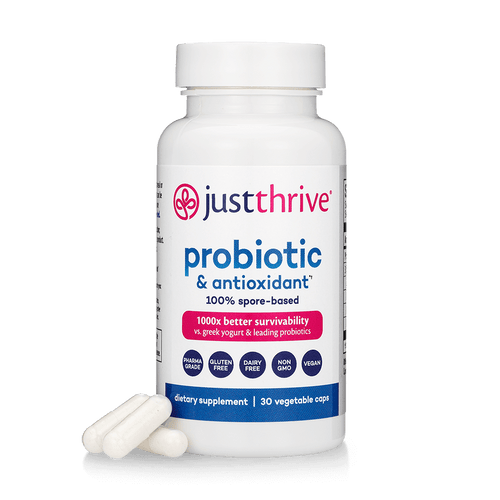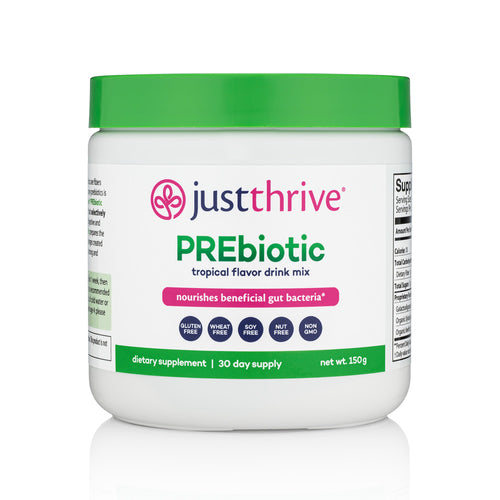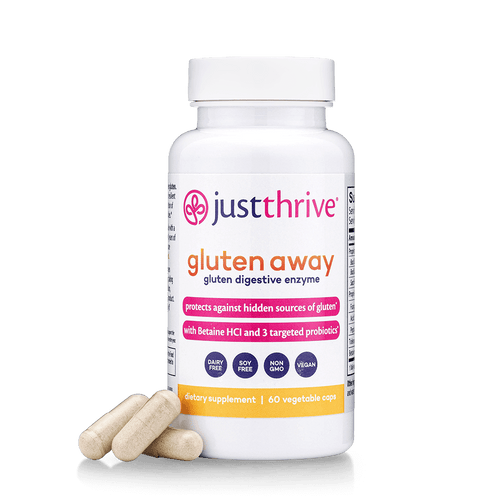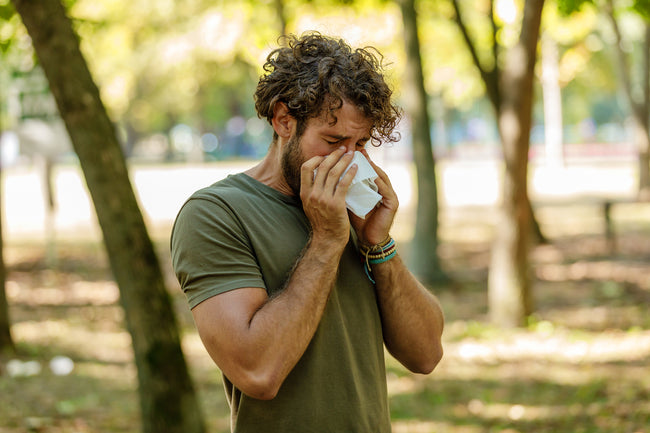The mysterious link that can really mess up your gut (and how to avoid the gut distress).
If you’ve ever taken antibiotics, you know the nasty effects they can have on your gut. Diarrhea affects up to 70% of adults who take antibiotics… and it’s far from the only uncomfortable side effect.
And now it turns out that can happen even if you aren’t on antibiotics. You could end up with the same consequences if you live with someone taking them.
So you need to take proactive steps to keep your gut healthy and comfortable no matter what, because you never know when you or someone close to you will need a course of antibiotics.
What Antibiotics Do to Your Gut
Your gut microbiome contains trillions of bacteria, including both beneficial probiotics and harmful pathogens. A healthy gut contains vastly more probiotics than pathogens, and those probiotics work in dozens of ways to keep you well including:
- Proper immune system function so it can fight off infections effectively[1]
- Production of short chain fatty acids (SCFAs) which help manage blood sugar, protect brain cells, and support heart and liver health[2]
- Complete nutrient absorption so you get more out of everything you eat[3]
- Smooth, comfortable digestion without gastrointestinal (GI) distress[4]
But when your gut microbiome gets knocked out of balance by antibiotics, those benefits disappear.[5] Pathogens begin to outnumber probiotic bacteria, causing something called dysbiosis[6], and that can cause a new set of problems.
Antibiotic Consequences Can Make You Sick
When you fill a prescription for antibiotics, you get the paper brochure that comes with it. That usually includes a full page of potential side effects and adverse consequences… a list you probably don’t read (or don’t want to read).Because they kill off all the beneficial probiotic bacteria in your gut, antibiotics can have a profoundly negative impact on your overall health.[7] So while they will protect you from dangerous pathogens, these powerful drugs can leave you with a long list of side effects including:[8]
- Diarrhea
- Nausea
- Vomiting
- Bloating
- Abdominal pain
- Indigestion
- Dizziness
- Rashes
- Loss of appetite
- Yeast infections
Those issues may linger long after you stop taking antibiotics; research shows that it can take years for your gut microbiome to recover fully from antibiotic treatment.[9] That’s a long time to suffer from side effects.
Worse, you could end up with dysbiosis and all of the consequences that come with it, even if you haven’t taken them but someone in your household has. That’s right… If someone you live with takes antibiotics that disrupt their gut, it can do the same to you.

The Bacterial Cloud Affects Your Household
We all have our own bacterial cloud that surrounds us and follows us everywhere.[10] And while your bacterial cloud is unique, it influences the bacteria of the people you live with… and theirs can influence yours as well. Housemates, especially romantic couples, start to share the same bacteria.[11]
So if one housemate takes antibiotics and develops dysbiosis… the other people living in that household will have a similar effect.
A new study looked at what happened to people living in the same house when one of them took either azithromycin or amoxicillin, commonly prescribed antibiotics. The results were shocking…
Probiotic bacteria levels dropped significantly in housemates of people taking antibiotics.[12]
Bottom line: You need to support your microbiome health at all times. And the best way to do that… especially when antibiotics are involved… is with spore probiotics.
 Want to listen instead of read? CLICK HERE
Want to listen instead of read? CLICK HERE
Spore Probiotics Proactively Sure Up Your Gut
Most probiotics are vulnerable to antibiotics, but spore probiotics are tougher and more resilient than your standard off-the-shelf option.
Spore probiotics come encased in an endospore shell that help them survive harsh environments and extreme temperatures. And they’re also able to resist death by antibiotics.[13] So if you or anyone in your household is taking antibiotics, spore probiotics can keep your gut microbiome in healthy balance.[14] And that microbiome support can reduce the risk of antibiotic-associated diarrhea in adults by up to 37%.[15]
In addition to setting the stage for a diverse population of probiotic bacteria in your gut microbiome, specific spore probiotics also work to cushion you against the effects of antibiotics and pathogens. And since you can take them along with antibiotics, they can help you sidestep some potential side effects.
Bacillus subtilis produces more than 24 compounds that help keep pathogen populations under control in the gut microbiome.[16]
Bacillus clausii resists even the use of multiple antibiotics to help safeguard against antibiotic-associated diarrhea.[17]
Bacillus coagulans helps maintain a healthy gut microbiome even during antibiotic treatment to help minimize the chance of antibiotic-associated diarrhea.[18]
Bottom line: You need to be proactive to keep your gut microbiome in good shape during antibiotic treatment… even if you’re not the one being treated.
Keep Your Gut in Healthy Balance With Just Thrive
A healthy gut microbiome is the key to overall wellness, and it’s extra important to support your gut when it’s facing potential threats. Just Thrive Probiotic & Antioxidant contains a clinically studied combination of powerful spore probiotics including:- Bacillus subtilis HU58™
- Bacillus clausii (SC-109)
- Bacillus coagulans (SC-208)
- Bacillus indicus HU36™
Just Thrive Probiotic & Antioxidant helps keep your gut well-balanced and supports a vast population of diverse beneficial probiotic bacteria.
>> Try Just Thrive Probiotic & Antioxidant TODAY for a healthy gut microbiome at home (or anywhere)
Not sure Just Thrive Probiotic & Antioxidant will work for you? We can help you with that.
EVERY Just Thrive purchase is covered by our Bottom of the Bottle, 100% money back guarantee.
That means you can try Just Thrive Probiotic & Antioxidant to see if it works well for you… and we’re betting it will.
But if for any reason you don’t feel a difference, you can ask for a full product refund at any time. Even if it’s 3 months or 3 years later. Even if the bottle is empty! You’ll get your money back any time, no hassles, no hard feelings.
>> Tap HERE to test drive Just Thrive Probiotic, RISK-FREE, and save 30% on your first month’s subscription with code SUB30.
Sources
- Wiertsema SP, van Bergenhenegouwen J, Garssen J, Knippels LMJ. The Interplay between the Gut Microbiome and the Immune System in the Context of Infectious Diseases throughout Life and the Role of Nutrition in Optimizing Treatment Strategies. Nutrients. 2021;13(3):886. doi: 10.3390/nu13030886. PMID: 33803407; PMCID: PMC8001875.
- Xiong RG, Zhou DD, Wu SX, Huang SY, Saimaiti A, Yang ZJ, Shang A, Zhao CN, Gan RY, Li HB. Health Benefits and Side Effects of Short-Chain Fatty Acids. Foods. 2022;11(18):2863. doi: 10.3390/foods11182863. PMID: 36140990; PMCID: PMC9498509.
- Rowland I, Gibson G, Heinken A, Scott K, Swann J, Thiele I, Tuohy K. Gut microbiota functions: metabolism of nutrients and other food components. Eur J Nutr. 2018;57(1):1-24. doi: 10.1007/s00394-017-1445-8. Epub 2017 Apr 9. PMID: 28393285; PMCID: PMC5847071.
- Bull MJ, Plummer NT. Part 1: The Human Gut Microbiome in Health and Disease. Integr Med (Encinitas). 2014;13(6):17-22. PMID: 26770121; PMCID: PMC4566439.
- Yoon MY, Yoon SS. Disruption of the Gut Ecosystem by Antibiotics. Yonsei Med J. 2018;59(1):4-12. doi: 10.3349/ymj.2018.59.1.4. PMID: 29214770; PMCID: PMC5725362.
- Ramirez J, Guarner F, Bustos Fernandez L, Maruy A, Sdepanian VL, Cohen H. Antibiotics as Major Disruptors of Gut Microbiota. Front Cell Infect Microbiol. 2020;10:572912.
- Zhang L, Zeng X, Guo D, Zou Y, Gan H, Huang X. Early use of probiotics might prevent antibiotic-associated diarrhea in elderly (>65 years): a systematic review and meta-analysis. BMC Geriatr. 2022;22(1):562. doi: 10.1186/s12877-022-03257-3. PMID: 35794520; PMCID: PMC9260993.
- Mohsen S, Dickinson JA, Somayaji R. Update on the adverse effects of antimicrobial therapies in community practice. Can Fam Physician. 2020;66(9):651-659. PMID: 32933978; PMCID: PMC7491661.
- Lekang K, Shekhar S, Berild D, Petersen FC, Winther-Larsen HC. Effects of different amoxicillin treatment durations on microbiome diversity and composition in the gut. PLoS One. 2022;17(10):e0275737. doi: 10.1371/journal.pone.0275737. PMID: 36301847; PMCID: PMC9612567.
- Meadow JF, Altrichter AE, Bateman AC, Stenson J, Brown GZ, Green JL, Bohannan BJ. Humans differ in their personal microbial cloud. PeerJ. 2015;3:e1258. doi: 10.7717/peerj.1258. PMID: 26417541; PMCID: PMC4582947.
- Kiecolt-Glaser JK, Wilson SJ, Madison A. Marriage and Gut (Microbiome) Feelings: Tracing Novel Dyadic Pathways to Accelerated Aging. Psychosom Med. 2019;81(8):704-710.
- Chopyk J, Cobián Güemes AG, Ramirez-Sanchez C, Attai H, Ly M, Jones MB, Liu R, Liu C, Yang K, Tu XM, Abeles SR, Nelson K, Pride DT. Common antibiotics, azithromycin and amoxicillin, affect gut metagenomics within a household. BMC Microbiol. 2023;23(1):206. doi: 10.1186/s12866-023-02949-z. PMID: 37528343; PMCID: PMC10394940.
- "Antibiotic Resistance in Spore-Forming Probiotic Bacteria." American Society for Microbiology. Published June 21, 2019. Available from: https://asm.org/Press-Releases/2019/June/Antibiotic-Resistance-in-Spore-Forming-Probiotic-B
- Fernández-Alonso M, Aguirre Camorlinga A, Messiah SE, Marroquin E. Effect of adding probiotics to an antibiotic intervention on the human gut microbial diversity and composition: a systematic review. J Med Microbiol. 2022 Nov;71(11):
- Goodman C, Keating G, Georgousopoulou E, Hespe C, Levett K. Probiotics for the prevention of antibiotic-associated diarrhea: a systematic review and meta-analysis. BMJ Open. 2021;11(8):e043054. doi: 10.1136/bmjopen-2020-043054. PMID: 34385227; PMCID: PMC8362734.
- Stein T. Bacillus subtilis antibiotics: structures, syntheses and specific functions. Mol Microbiol. 2005 May;56(4):845-57. doi: 10.1111/j.1365-2958.2005.04587.x. PMID: 15853875.
- De Castro, JA., Kesavelu, D., Lahiri, K.R. et al. Recommendations for the adjuvant use of the poly-antibiotic–resistant probiotic Bacillus clausii (O/C, SIN, N/R, T) in acute, chronic, and antibiotic-associated diarrhea in children: consensus from Asian experts. Trop Dis Travel Med Vaccines 6, 21 (2020).
- Gupta AK, Maity C. Efficacy and safety of Bacillus coagulans LBSC in irritable bowel syndrome: A prospective, interventional, randomized, double-blind, placebo-controlled clinical study [CONSORT Compliant]. Medicine (Baltimore). 2021 Jan 22;100(3):e23641. doi: 10.1097/MD.0000000000023641. PMID: 33545934; PMCID: PMC7837859.














